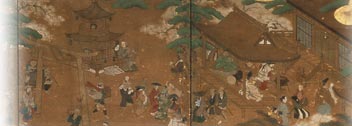Chikamatsu Project Lovers' Suicides at Imamiya, directed by Masako Yuasa
Outline
| date | June 5–6, 2008 |
|---|---|
| Venue | Waseda University (Ono Memorial Hall) |
| Organizer | |
| outline | Chikamatsu Project Lovers' Suicides at Imamiya, directed by Masako Yuasa |
Details
On June 5 and 6, 2008, the Chikamatsu Theatre Company, based at the University of Hull in the U.K., staged a production of the play Imamiya no shinju ["Lovers' Suicide at Imamiya"], written by the Edo-period playwright Chikamatsu Monzaemon, and directed by Masako Yuasa, in the Ono Memorial Hall at Waseda University. This production was part of the Anglo-Japan Joint Theatre Chikamatsu Project, a collaborative endeavor between three universities, the University of Hull in the UK, Osaka City University, and Waseda University (under the auspices of the Tsubouchi Theatre Museum Global COE programme). The production will tour four cities in the UK and Japan: in addition to Tokyo, there will be performances in Hull (at the University of Hull's Donald Roy Theatre, March 3–8), Osaka (at the Seika Theater, May 30–31), and the city of Edinburgh (at the Edinburgh International Festival, August 18–23).The Anglo-Japan Joint Theatre Project is the brainchild of Masako Yuasa, Honorary Research Fellow of the University of Hull, and director, translator and producer of the company; and its purpose is to stage all-English-cast productions of Chikamatsu's plays, in English. Its first production of the Chikamatsu play Onna-koroshi abura-no-jigoku ["Woman-killer in Oil Hell"] was in 2004 (performed in UK only). In 2006, its second production Horikawa nami-no-tsuzumi ["Drumbeats over the Horikawa River"] was put on at Waseda University under the auspices of the 21st Century Global COE programme.
The present production, chosen from amongst Chikamatsu's love suicide plays, is the Company's third production, and like the second its cast consists entirely of students in the Department of Drama and Music at the University of Hull. Familiarizing themselves with the culture of pre-modern Osaka that permeates the work, and learning how to move correctly in Japanese kimono, must have involved quite a bit of effort for these students, but the audience was completely unconscious of any awkwardness for the 90 minutes of the play, which kept them spell-bound, and the performances were met with enthusiastic applause.
On June 6, the performance of the play was immediately followed by a lecture by Yuasa, titled "The Meaning of Producing a Traditional Japanese Play in English". In her talk Yuasa explained what had led her to translate Chikamatsu, and the difficulties she has encountered in the process. This was followed by a symposium, titled "Making Chikamatsu Known to the World", in which Yuasa was joined by D. Keith Peacock, senior lecturer at the University of Hull, Bunzo Torigoe, former director of the Theatre Museum, and Mikio Takemoto, present director of the Theatre Museum and the Global COE Programme Leader. A very interesting discussion ensued, covering diverse topics from the history of translation of Chikamatsu into English, the history of Chikamatsu productions in countries outside Japan, the problems one can encounter in translating Chikamatsu into colloquial language, to the history of plays in translation in general in the UK, and the reception of Shakespeare's plays in recent years. This was followed by a lively Q&A session. The 90-minute session was extremely interesting and informative.
The objective of the Anglo-Japan Joint Theatre Chikamatsu Project is to have Chikamatsu's plays become part of the repertoire of world theatre, on a par with the plays of Shakespeare or Chekhov, through their introduction to the English-speaking world. For Japanese people, there is the additional benefit that seeing Chikamatsu plays in a foreign production gives them the opportunity to gain a totally new appreciation of the themes and structural elements in the plays. Further, the very rarity of productions of traditional Japanese plays in translation means that this production will have many lessons about the possibilities and difficulties in such an endeavor.


